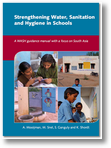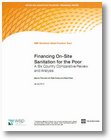
Water, sanitation and hygiene (WASH) in schools programmes are globally recognised as essential to promoting children’s right to health. WASH in schools influences a generational change in health promotion behaviour and attitudes. If schoolchildren have access to clean and appropriate toilets, functioning handwashing facilities with soap, sufficient and safe drinking water and have developed adequate hygiene skills, they are more likely to be healthier and to positively influence hygiene practices among family members and the wider community.
This book is meant for managers and trainers involved in water, sanitation and hygiene programmes in schools, whether operating at state, district or block level. It provides information on a number of essential topics related to WASH in schools and contains relevant activity sheets.
Download (PDF; 5.6 MB)

 Going by Social Media standards, World Water Day 2010 has been a full success. “World Water Day” is a
Going by Social Media standards, World Water Day 2010 has been a full success. “World Water Day” is a  New publication by the Water and Sanitation Program (WSP): “
New publication by the Water and Sanitation Program (WSP): “